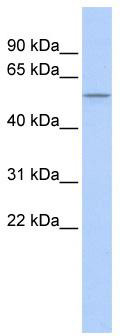PPAR delta (PPARD) Rabbit Polyclonal Antibody
Other products for "PPARD"
Specifications
| Product Data | |
| Applications | IHC, WB |
| Recommended Dilution | WB |
| Reactivities | Human |
| Host | Rabbit |
| Isotype | IgG |
| Clonality | Polyclonal |
| Immunogen | The immunogen for anti-PPARD antibody: synthetic peptide directed towards the n terminal of human PPARD. Synthetic peptide located within the following region: MEQPQEEAPEVREEEEKEEVAEAEGAPELNGGPQHALPSSSYTDLSRSSS |
| Formulation | Liquid. Purified antibody supplied in 1x PBS buffer with 0.09% (w/v) sodium azide and 2% sucrose. Note that this product is shipped as lyophilized powder to China customers. |
| Purification | Affinity Purified |
| Conjugation | Unconjugated |
| Storage | Store at -20°C as received. |
| Stability | Stable for 12 months from date of receipt. |
| Predicted Protein Size | 49 kDa |
| Gene Name | peroxisome proliferator activated receptor delta |
| Database Link | |
| Background | PPARD is a member of the peroxisome proliferator-activated receptor (PPAR) family. PPARs are nuclear hormone receptors that bind peroxisome proliferators and control the size and number of peroxisomes produced by cells. PPARs mediate a variety of biological processes, and may be involved in the development of several chronic diseases, including diabetes, obesity, atherosclerosis, and cancer. This protein is a potent inhibitor of ligand-induced transcription activity of PPAR delta and PPAR gamma. It may function as an integrator of transcription repression and nuclear receptor signaling. The expression of this gene is found to be elevated in colorectal cancer cells. The elevated expression can be repressed by adenomatosis polyposis coli (APC), a tumor suppressor protein related to APC/beta-catenin signaling pathway. Knockout studies in mice suggested the role of this protein in myelination of the corpus callosum, lipid metabolism, and epidermal cell proliferation. |
| Synonyms | FAAR; NR1C2; NUC1; NUCI; NUCII; PPARB |
| Note | Immunogen Sequence Homology: Human: 100%; Pig: 93%; Rat: 93%; Horse: 93%; Guinea pig: 93%; Yeast: 90%; Mouse: 86%; Bovine: 80%; Dog: 79%; Rabbit: 79% |
| Reference Data | |
| Protein Families | Druggable Genome, Nuclear Hormone Receptor, Transcription Factors |
| Protein Pathways | Acute myeloid leukemia, Pathways in cancer, PPAR signaling pathway, Wnt signaling pathway |
Documents
| Product Manuals |
| FAQs |
{0} Product Review(s)
0 Product Review(s)
Submit review
Be the first one to submit a review
Product Citations
*Delivery time may vary from web posted schedule. Occasional delays may occur due to unforeseen
complexities in the preparation of your product. International customers may expect an additional 1-2 weeks
in shipping.






























































































































































































































































 Germany
Germany
 Japan
Japan
 United Kingdom
United Kingdom
 China
China




